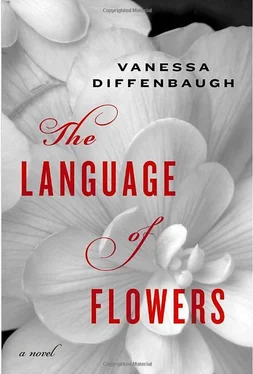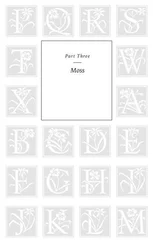“Me, too.”
Elizabeth pushed the bowl of ice cream across the table, and our eyes met. I had come back. Maybe it wasn’t too late, after all.
I took a cold, creamy bite. When I looked up, Hazel had turned. She peered shyly at me, her thin lips parted. I refilled the spoon, lifted it in slow-motion to my lips, and just before taking a bite, turned the spoon to her waiting tongue. She swallowed, smiled, and hid her face in Elizabeth’s chest. Then, looking up, she opened her mouth again. I scooped up a second bite of ice cream and slipped it between her lips.
Elizabeth’s gaze flicked from the baby’s face to mine. “How’ve you been?” she asked.
“Fine,” I said, avoiding her stare.
She shook her head. “No way. I want to know exactly how you’ve been, since the moment I last saw you in court. I want to know everything, starting with where you went when you ran from the courthouse.”
“I didn’t get far. Meredith caught me and put me in a group home, as she’d promised.”
“Was it awful?” Elizabeth asked. There was dread in her eyes, and I knew she was waiting for me to confirm her worst nightmares of what my life had been like for the past decade.
“For the other girls in the home,” I said wryly, remembering the adolescent I’d been and all the harm I’d caused. “For me, it was only awful because I wasn’t here, with you.”
Elizabeth’s eyes welled. In her lap, Hazel banged impatient fists on the table. I fed her another bite, and she reached out, as if she wanted me to pick her up. I looked at Elizabeth.
She nodded, encouraging. “Go ahead.”
With trembling hands, I grasped Hazel underneath her armpits, lifting her up and pulling her to me. She was heavier than I expected. When I set her down in my lap, she wiggled her diapered bottom back against my abdomen and tucked her head under my chin. I dipped my face into the back of her hair. She smelled like Elizabeth: cooking oil, cinnamon, and citrus soap. I inhaled, wrapping my arms around her waist.
Hazel reached into the bowl, submerging her fingers in the melted cream. Elizabeth and I watched her eat, the ice cream dripping onto her bibless linen dress. Her brow, in concentration, was as serious as her father’s.
“Where do you live?” Elizabeth asked.
“I have an apartment. A business, too. I arrange flowers for weddings, anniversaries, that kind of thing.”
“Grant says you’re amazing. He told me women line up for blocks, wait months to buy flowers from you.”
I shrugged. “Everything I know,” I said, “I learned here.”
I looked around, remembering the afternoon Elizabeth sliced open a lily on a cutting board at this same kitchen table. Everything was exactly as I remembered—the table and chairs, the clean countertop, and the deep white porcelain sink. The only addition was a painting, a matchbox-sized rendering of purple hyacinth, floating in a blue glass frame and placed in the windowsill next to the row of blue bottles.
“From Catherine?” I asked, nodding to the painting.
Elizabeth shook her head. “From Grant. Catherine died before painting a hyacinth she liked well enough to give me. But this was Grant’s favorite, and he wanted me to have it.”
“It’s beautiful.”
Elizabeth nodded. “I love it.” She stood and brought it to the table, setting it between us. I studied the way the individual flowers clustered around the single stalk, their sharp points fitting together like pieces of a puzzle. Something about the configuration of the petals made me believe that forgiveness should come naturally, but in this family, it hadn’t. I thought about the decades of misunderstandings, from the yellow rose to the fire, the thwarted attempts at forgiving and being forgiven.
“Everything’s changed,” Elizabeth said, as if responding to my thoughts. “Grant and I, after so many years, are a family again. I hope you’ve come back to be a part of it. We’ve all missed you enough, haven’t we, Hazel?”
Hazel’s attention was on the bowl, empty now. She turned it upside down, picking it up again and studying the creamy ring on the table. With her fingers, she spread the cream around in circles, a wild, sugary abstraction on the wood.
Elizabeth’s hand inched toward mine on the table. She offered it to me, and in doing so it felt like she was offering me a path back into the family, the family in which I was loved, as a daughter, as a partner, as a mother. I reached for her hand. Hazel slipped hers, sticky and warm, between our palms.
But even with the clear forgiveness in Elizabeth’s words, I had one more question.
“What happened to the vineyard?” I asked. The dread I felt was the same as the dread in Elizabeth’s voice when she had asked me about my adolescence in group homes. We had both imagined the worst.
“We replanted. The loss was substantial, but it was overshadowed completely by losing you. For years the new vines were thin, the weeds thick. I left the house only in the fall, to do the tasting, and only because Carlos practically broke down my door every evening.”
The trailer was gone now. Carlos, too.
“He moved back to Mexico a year ago, after Perla went to college,” Elizabeth explained. “His parents were old, and ill. I’d finally learned to manage my grief, and my vineyard, too. I didn’t need him anymore.”
The loss of my own daughter would have gotten easier, then, if I had waited long enough. But a decade is a long time to wait. I pressed my nose down into Hazel’s curly hair, inhaling again her sweet smell.
“The grapes must be close,” I said.
“Probably. I haven’t checked for three days. It’s harder now”—she nodded toward Hazel—“but worth it.”
“Do you want my help?” I asked, gesturing to the vineyard.
Elizabeth smiled. “Yes,” she said. “Let’s go.” She picked up a damp dishcloth from the drying rack and wiped Hazel’s hands and face as she squirmed.
Outside, we climbed onto the red tractor. Elizabeth first, then, after passing up Hazel, I followed. Hazel sat in Elizabeth’s lap, her arms reaching out to touch the steering wheel, but when the engine started, she turned and buried her face in Elizabeth’s chest, pressing one ear into her armpit to muffle the sound. We bumped up the road past the place the trailer had been, onto the hill where I’d found the ripe grape, the year I started the fire. Elizabeth cut the engine.
The vineyard was silent. Hazel pulled away from Elizabeth, looking out over the grapevines, to the house. Her sleepy eyes tracked the roofline to the upstairs windows. When she turned in my direction, she startled, as if she’d forgotten I was there, and then she smiled, a slow, shy, radiant smile. Reaching for me, she squealed in delight, and the high-pitched noise broke a fine line into my nut-covered heart as cleanly as it would have split a delicate crystal glass.
I pulled her to me. We slid down from the tractor and crouched in the vines. Hazel pressed her face into a cluster of grapes, and I joined her. Picking one, I pierced it open with my teeth and gave a tiny sliver to Hazel. She had already been taught. Together we chewed the skin, swished the soft middle from cheek to cheek.
I smiled. 75/7. The grapes were ripe.
I placed my bluebox on the bookshelf, in the empty space next to Grant’s orange one. The cloth-covered boxes fit snuggly between a botany textbook and a poetry anthology, in the space they’d occupied when Grant and I had lived in the water tower together the year before.
It was Thanksgiving Day. All morning I’d helped Grant, chopping vegetables and whipping potatoes and cutting roses for the table. Any moment, Elizabeth would arrive. Hazel, too. Grant wanted everything to be perfect. When I’d left him in the kitchen, he’d been pacing in front of the gravy, checking the temperature of the oven often enough to let out most of the hot air. The turkey wouldn’t be ready until late evening, but it didn’t matter to me. I wasn’t going anywhere.
Читать дальше












